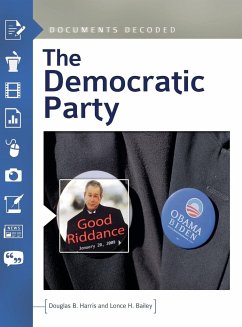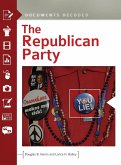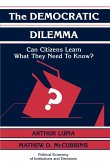- Gebundenes Buch
- Merkliste
- Auf die Merkliste
- Bewerten Bewerten
- Teilen
- Produkt teilen
- Produkterinnerung
- Produkterinnerung
Through an examination of key historical documents, this book chronicles the Democratic Party's complete transformation from the small-government, Jeffersonian party to a party of activist government and social progressivism during the presidencies of Franklin D. Roosevelt, Lyndon Johnson, Bill Clinton, and Barack Obama. What are the objectives of today's Democratic Party, and what historic events have guided its evolution from a decidedly different ideological starting point more than 200 years ago? The Democratic Party: Documents Decoded supplies a thorough historical examination of the…mehr
Andere Kunden interessierten sich auch für
![The Republican Party The Republican Party]() Douglas HarrisThe Republican Party95,99 €
Douglas HarrisThe Republican Party95,99 €![Oman - The Islamic Democratic Tradition Oman - The Islamic Democratic Tradition]() Hussein GhubashOman - The Islamic Democratic Tradition73,99 €
Hussein GhubashOman - The Islamic Democratic Tradition73,99 €![The Democratic Dilemma The Democratic Dilemma]() Arthur LupiaThe Democratic Dilemma27,99 €
Arthur LupiaThe Democratic Dilemma27,99 €![The Military's Impact on Democratic Development The Military's Impact on Democratic Development]() The Military's Impact on Democratic Development181,99 €
The Military's Impact on Democratic Development181,99 €![Oman - The Islamic Democratic Tradition Oman - The Islamic Democratic Tradition]() Hussein GhubashOman - The Islamic Democratic Tradition219,99 €
Hussein GhubashOman - The Islamic Democratic Tradition219,99 €![The Party System The Party System]() Hilaire BellocThe Party System34,99 €
Hilaire BellocThe Party System34,99 €![Nigeria's Democratic Experience in the Fourth Republic since 1999 Nigeria's Democratic Experience in the Fourth Republic since 1999]() Nigeria's Democratic Experience in the Fourth Republic since 1999140,99 €
Nigeria's Democratic Experience in the Fourth Republic since 1999140,99 €-
-
-
Through an examination of key historical documents, this book chronicles the Democratic Party's complete transformation from the small-government, Jeffersonian party to a party of activist government and social progressivism during the presidencies of Franklin D. Roosevelt, Lyndon Johnson, Bill Clinton, and Barack Obama. What are the objectives of today's Democratic Party, and what historic events have guided its evolution from a decidedly different ideological starting point more than 200 years ago? The Democratic Party: Documents Decoded supplies a thorough historical examination of the Democratic Party from its distant origins in George Washington's administration to the two-term administration of Barack Obama. Told through key documents and speeches, this history comes alive in the words and thoughts of those who built, sustained, and transformed the Democratic Party. No other book uses documents in this way to tell a comprehensive history of this party. The book utilizes primary documents to investigate a breadth of topics such as the Democratic party's positions on civil rights, discrimination, voting rights, taxation, representation, immigration, primary elections, caucuses, the Republican opposition, relations between church and state, the role of government, and foreign policy. The scholarly commentary provides essential context that bridges the gaps between documents and insightful explanations and clarifications of specific passages or terms to ensure reader comprehension. A work unlike any other on the history of the Democratic Party, this book will serve advanced high school students in government and history classes as well as undergraduate students taking courses in political science and history.
Hinweis: Dieser Artikel kann nur an eine deutsche Lieferadresse ausgeliefert werden.
Hinweis: Dieser Artikel kann nur an eine deutsche Lieferadresse ausgeliefert werden.
Produktdetails
- Produktdetails
- Verlag: ABC-CLIO
- Seitenzahl: 324
- Erscheinungstermin: 7. Oktober 2014
- Englisch
- Abmessung: 286mm x 221mm x 22mm
- Gewicht: 1078g
- ISBN-13: 9781610696432
- ISBN-10: 1610696433
- Artikelnr.: 40312432
- Herstellerkennzeichnung
- Libri GmbH
- Europaallee 1
- 36244 Bad Hersfeld
- gpsr@libri.de
- Verlag: ABC-CLIO
- Seitenzahl: 324
- Erscheinungstermin: 7. Oktober 2014
- Englisch
- Abmessung: 286mm x 221mm x 22mm
- Gewicht: 1078g
- ISBN-13: 9781610696432
- ISBN-10: 1610696433
- Artikelnr.: 40312432
- Herstellerkennzeichnung
- Libri GmbH
- Europaallee 1
- 36244 Bad Hersfeld
- gpsr@libri.de
Douglas B. Harris is associate professor of political science at Loyola University Maryland. Lonce H. Bailey, PhD, is assistant professor of political science at Shippensburg University of Pennsylvania.
Introduction: The Democratic Party's Origins, Evolution, and
Transformation,
Chapter 1. "Baneful Effects," Good Feelings, and the Rise of Democratic
Populism: 1796-1896,
Introduction
"The Baneful Effects of the Spirit of Party,"
George Washington's Farewell Address
September 19, 1796
"We Are All Republicans, We Are All Federalists,"
Thomas Jefferson's First Inaugural Address
March 4, 1801
"To the People Belongs the Right,"
Andrew Jackson's First State of the Union Address
December 8, 1829
Maintaining Liberty,
Andrew Jackson's Second Inaugural Address
March 4, 1833
The Popular Will,
Democratic Party Platform of 1856
June 2, 1856
"Our National Destiny,"
Grover Cleveland's Inaugural Address
March 4, 1885
"Cross of Gold,"
William Jennings Bryan, Speech at the Democratic National Convention
July 9, 1896
Chapter 2. Progressivism, National Purpose, and the Emergence of the New
Deal,
Introduction
More Popular Government,
Democratic Party Platform, 1912 Convention
June 25, 1912
"What Is Progress?,"
Woodrow Wilson Campaign Speech
1912
"We Hold Very Definite Ideals,"
Woodrow Wilson's Acceptance Speech, Democratic National Convention
September 2, 1916
"Liberty under the Law,"
Al Smith's Democratic Party Acceptance Speech
August 22, 1928
"I Pledge You-I Pledge Myself to a New Deal for the American People,"
Franklin D. Roosevelt's Democratic Party Nomination Speech
July 2, 1932
"The Candidate Discusses the National Democratic Platform,"
Franklin Delano Roosevelt Campaign Radio Address
July 30, 1932
"The Only Thing We Have to Fear Is Fear Itself,"
Franklin Delano Roosevelt, First Inaugural Address
March 4, 1933
"Four Freedoms" Speech,
Franklin Delano Roosevelt's State of the Union Address
January 6, 1941
Chapter 3. The Cold War and Civil Rights: Transitions to the Modern
Democratic Party,
Introduction
The Truman Doctrine,
Harry S. Truman, Address before Congress
March 12, 1947
"The Bright Sunshine of Human Rights,"
Hubert Humphrey's Address to the Democratic National Convention
July 14, 1948
Desegregating the Armed Services,
Harry S. Truman, Executive Order 9981
July 26, 1948
Whistle-Stop Tour,
Harry S. Truman's Campaign Speech, Trenton, Missouri
September 18, 1948
Southern Manifesto,
Declaration of Constitutional Principles
March 12, 1956
"This New America,"
Adali Stevenson's Democratic Convention Nomination Acceptance Speech
August 17, 1956
"Ask Not What Your Country Can Do for You,"
John F. Kennedy, Inaugural Address
January 20, 1961
The Great Society,
Lyndon B. Johnson's Speech at the University of Michigan
May 22, 1964
"I Question America,"
Fannie Lou Hamer's Testimony to the Credentials Committee, National
Democratic Convention
August 22, 1964
"We Must Seek the Courage,"
Lyndon B. Johnson's Democratic National Convention Acceptance Speech
August 27, 1964
"There Is Only an American Problem,"
Lyndon B. Johnson, Speech before Congress on the Voting Rights Act
March 15, 1965
Chapter 4. Democrats in Disarray: Vietnam, New Politics, and the Reagan
Era,
Introduction
"The Present Divisions within Our Party,"
Senator Robert Kennedy, Announcement of Presidential Campaign
March 16, 1968
Announcement of the Assassination of Martin Luther King Jr.,
Robert Kennedy, Campaign Stop
April 4, 1968
"Democracy Affords Debate, Discussion and Dissent,"
Hubert Humphrey's Nomination Acceptance Speech, Democratic National
Convention
August 29, 1968
"Come Home America,"
George McGovern, Nomination Acceptance Speech, Democratic National
Convention
July 14, 1972
"Restore the Social Intercourse,"
Barbara Jordan's Keynote Address to the Democratic National Convention
July 12, 1976
A United Democratic Party,
Jimmy Carter's Nomination Acceptance Speech, Democratic National Convention
July 15, 1976
"Crisis of Confidence,"
Jimmy Carter, Address to the Nation regarding the Energy Crisis
July 15, 1979
"Tale of Two Cities,"
Mario Cuomo's Keynote Address to the Democratic National Convention
July 16, 1984
The Rainbow Coalition,
Jesse Jackson's Keynote Address at the Democratic National Convention
July 18, 1984
Chapter 5. New Democrats: Building a Bridge to the 21st Century,
Introduction
New Orleans Declaration,
Statement Endorsed at the Fourth Annual Democratic Leadership Council
Conference
March 1, 1990
A New Covenant,
Bill Clinton's Address Accepting the Democratic Presidential Nomination
July 16, 1992
"There Is Not Room,"
Richard Shelby's Press Conference Announcing Party Switch
November 9, 1994
"The Era of Big Government Is Over,"
Bill Clinton's State of the Union Address
January 23, 1996
"We're for the People,"
Al Gore's Acceptance Speech
August 17, 2000
"Bring America Together,"
Al Gore's Concession Speech
December 13, 2000
Preparing for the 21st Century,
Bill Clinton's Farewell Address
January 18, 2001
Chapter 6. Resigned to Opposition: Democrats in the George W. Bush Years,
Introduction
Changing Senate Leadership,
Richard Durbin Speaks about James Jeffords's Party Switch
May 24, 2001
"America Suffers Today,"
Richard Gephardt's Speech after the 9/11 Terrorist Attacks
September 11, 2001
"Both Parties Stand United,"
Tom Daschle's Speech after the 9/11 Terrorist Attacks
September 12, 2001
"Today I Weep for My Country,"
Robert Byrd's Speech on the Iraq War
March 19, 2003
"Reporting for Duty,"
John Kerry's Nomination Acceptance Speech
July 29, 2004
The Democratic Vision,
Democratic Responses to George W. Bush's State of the Union Address
February 2, 2005
"Let Us Be the Congress,"
Nancy Pelosi's Speech upon Taking the Oath of Office
January 4, 2007
Chapter 7. Making History: Hope and Change in the Rise and Reign of Barack
Obama,
Introduction
"We've Changed This Country Before,"
Barack Obama's Announcement of Candidacy
February 10, 2007
"I Am Still Standing,"
Hillary Clinton's Remarks at the New Hampshire Democratic Party 100 Club
Dinner
January 4, 2008
"Yes We Can,"
Barack Obama's Remarks on Election Night
November 4, 2008
"This Is the Meaning of Our Liberty,"
Barack Obama's First Inaugural Address
January 20, 2009
"We Are a Nation That Does What Is Hard,"
Barack Obama and Joe Biden, Remarks at the Signing of the Health Insurance
Reform Bill
March 23, 2010
"Justice Has Been Done,"
Barack Obama's Remarks on the Death of Osama bin Laden
May 2, 2011
"Our Journey Is Not Complete,"
Barack Obama's Second Inaugural Address
January 20, 2013
Timeline,
Further Reading,
Index,
About the Authors,
Transformation,
Chapter 1. "Baneful Effects," Good Feelings, and the Rise of Democratic
Populism: 1796-1896,
Introduction
"The Baneful Effects of the Spirit of Party,"
George Washington's Farewell Address
September 19, 1796
"We Are All Republicans, We Are All Federalists,"
Thomas Jefferson's First Inaugural Address
March 4, 1801
"To the People Belongs the Right,"
Andrew Jackson's First State of the Union Address
December 8, 1829
Maintaining Liberty,
Andrew Jackson's Second Inaugural Address
March 4, 1833
The Popular Will,
Democratic Party Platform of 1856
June 2, 1856
"Our National Destiny,"
Grover Cleveland's Inaugural Address
March 4, 1885
"Cross of Gold,"
William Jennings Bryan, Speech at the Democratic National Convention
July 9, 1896
Chapter 2. Progressivism, National Purpose, and the Emergence of the New
Deal,
Introduction
More Popular Government,
Democratic Party Platform, 1912 Convention
June 25, 1912
"What Is Progress?,"
Woodrow Wilson Campaign Speech
1912
"We Hold Very Definite Ideals,"
Woodrow Wilson's Acceptance Speech, Democratic National Convention
September 2, 1916
"Liberty under the Law,"
Al Smith's Democratic Party Acceptance Speech
August 22, 1928
"I Pledge You-I Pledge Myself to a New Deal for the American People,"
Franklin D. Roosevelt's Democratic Party Nomination Speech
July 2, 1932
"The Candidate Discusses the National Democratic Platform,"
Franklin Delano Roosevelt Campaign Radio Address
July 30, 1932
"The Only Thing We Have to Fear Is Fear Itself,"
Franklin Delano Roosevelt, First Inaugural Address
March 4, 1933
"Four Freedoms" Speech,
Franklin Delano Roosevelt's State of the Union Address
January 6, 1941
Chapter 3. The Cold War and Civil Rights: Transitions to the Modern
Democratic Party,
Introduction
The Truman Doctrine,
Harry S. Truman, Address before Congress
March 12, 1947
"The Bright Sunshine of Human Rights,"
Hubert Humphrey's Address to the Democratic National Convention
July 14, 1948
Desegregating the Armed Services,
Harry S. Truman, Executive Order 9981
July 26, 1948
Whistle-Stop Tour,
Harry S. Truman's Campaign Speech, Trenton, Missouri
September 18, 1948
Southern Manifesto,
Declaration of Constitutional Principles
March 12, 1956
"This New America,"
Adali Stevenson's Democratic Convention Nomination Acceptance Speech
August 17, 1956
"Ask Not What Your Country Can Do for You,"
John F. Kennedy, Inaugural Address
January 20, 1961
The Great Society,
Lyndon B. Johnson's Speech at the University of Michigan
May 22, 1964
"I Question America,"
Fannie Lou Hamer's Testimony to the Credentials Committee, National
Democratic Convention
August 22, 1964
"We Must Seek the Courage,"
Lyndon B. Johnson's Democratic National Convention Acceptance Speech
August 27, 1964
"There Is Only an American Problem,"
Lyndon B. Johnson, Speech before Congress on the Voting Rights Act
March 15, 1965
Chapter 4. Democrats in Disarray: Vietnam, New Politics, and the Reagan
Era,
Introduction
"The Present Divisions within Our Party,"
Senator Robert Kennedy, Announcement of Presidential Campaign
March 16, 1968
Announcement of the Assassination of Martin Luther King Jr.,
Robert Kennedy, Campaign Stop
April 4, 1968
"Democracy Affords Debate, Discussion and Dissent,"
Hubert Humphrey's Nomination Acceptance Speech, Democratic National
Convention
August 29, 1968
"Come Home America,"
George McGovern, Nomination Acceptance Speech, Democratic National
Convention
July 14, 1972
"Restore the Social Intercourse,"
Barbara Jordan's Keynote Address to the Democratic National Convention
July 12, 1976
A United Democratic Party,
Jimmy Carter's Nomination Acceptance Speech, Democratic National Convention
July 15, 1976
"Crisis of Confidence,"
Jimmy Carter, Address to the Nation regarding the Energy Crisis
July 15, 1979
"Tale of Two Cities,"
Mario Cuomo's Keynote Address to the Democratic National Convention
July 16, 1984
The Rainbow Coalition,
Jesse Jackson's Keynote Address at the Democratic National Convention
July 18, 1984
Chapter 5. New Democrats: Building a Bridge to the 21st Century,
Introduction
New Orleans Declaration,
Statement Endorsed at the Fourth Annual Democratic Leadership Council
Conference
March 1, 1990
A New Covenant,
Bill Clinton's Address Accepting the Democratic Presidential Nomination
July 16, 1992
"There Is Not Room,"
Richard Shelby's Press Conference Announcing Party Switch
November 9, 1994
"The Era of Big Government Is Over,"
Bill Clinton's State of the Union Address
January 23, 1996
"We're for the People,"
Al Gore's Acceptance Speech
August 17, 2000
"Bring America Together,"
Al Gore's Concession Speech
December 13, 2000
Preparing for the 21st Century,
Bill Clinton's Farewell Address
January 18, 2001
Chapter 6. Resigned to Opposition: Democrats in the George W. Bush Years,
Introduction
Changing Senate Leadership,
Richard Durbin Speaks about James Jeffords's Party Switch
May 24, 2001
"America Suffers Today,"
Richard Gephardt's Speech after the 9/11 Terrorist Attacks
September 11, 2001
"Both Parties Stand United,"
Tom Daschle's Speech after the 9/11 Terrorist Attacks
September 12, 2001
"Today I Weep for My Country,"
Robert Byrd's Speech on the Iraq War
March 19, 2003
"Reporting for Duty,"
John Kerry's Nomination Acceptance Speech
July 29, 2004
The Democratic Vision,
Democratic Responses to George W. Bush's State of the Union Address
February 2, 2005
"Let Us Be the Congress,"
Nancy Pelosi's Speech upon Taking the Oath of Office
January 4, 2007
Chapter 7. Making History: Hope and Change in the Rise and Reign of Barack
Obama,
Introduction
"We've Changed This Country Before,"
Barack Obama's Announcement of Candidacy
February 10, 2007
"I Am Still Standing,"
Hillary Clinton's Remarks at the New Hampshire Democratic Party 100 Club
Dinner
January 4, 2008
"Yes We Can,"
Barack Obama's Remarks on Election Night
November 4, 2008
"This Is the Meaning of Our Liberty,"
Barack Obama's First Inaugural Address
January 20, 2009
"We Are a Nation That Does What Is Hard,"
Barack Obama and Joe Biden, Remarks at the Signing of the Health Insurance
Reform Bill
March 23, 2010
"Justice Has Been Done,"
Barack Obama's Remarks on the Death of Osama bin Laden
May 2, 2011
"Our Journey Is Not Complete,"
Barack Obama's Second Inaugural Address
January 20, 2013
Timeline,
Further Reading,
Index,
About the Authors,
Introduction: The Democratic Party's Origins, Evolution, and
Transformation,
Chapter 1. "Baneful Effects," Good Feelings, and the Rise of Democratic
Populism: 1796-1896,
Introduction
"The Baneful Effects of the Spirit of Party,"
George Washington's Farewell Address
September 19, 1796
"We Are All Republicans, We Are All Federalists,"
Thomas Jefferson's First Inaugural Address
March 4, 1801
"To the People Belongs the Right,"
Andrew Jackson's First State of the Union Address
December 8, 1829
Maintaining Liberty,
Andrew Jackson's Second Inaugural Address
March 4, 1833
The Popular Will,
Democratic Party Platform of 1856
June 2, 1856
"Our National Destiny,"
Grover Cleveland's Inaugural Address
March 4, 1885
"Cross of Gold,"
William Jennings Bryan, Speech at the Democratic National Convention
July 9, 1896
Chapter 2. Progressivism, National Purpose, and the Emergence of the New
Deal,
Introduction
More Popular Government,
Democratic Party Platform, 1912 Convention
June 25, 1912
"What Is Progress?,"
Woodrow Wilson Campaign Speech
1912
"We Hold Very Definite Ideals,"
Woodrow Wilson's Acceptance Speech, Democratic National Convention
September 2, 1916
"Liberty under the Law,"
Al Smith's Democratic Party Acceptance Speech
August 22, 1928
"I Pledge You-I Pledge Myself to a New Deal for the American People,"
Franklin D. Roosevelt's Democratic Party Nomination Speech
July 2, 1932
"The Candidate Discusses the National Democratic Platform,"
Franklin Delano Roosevelt Campaign Radio Address
July 30, 1932
"The Only Thing We Have to Fear Is Fear Itself,"
Franklin Delano Roosevelt, First Inaugural Address
March 4, 1933
"Four Freedoms" Speech,
Franklin Delano Roosevelt's State of the Union Address
January 6, 1941
Chapter 3. The Cold War and Civil Rights: Transitions to the Modern
Democratic Party,
Introduction
The Truman Doctrine,
Harry S. Truman, Address before Congress
March 12, 1947
"The Bright Sunshine of Human Rights,"
Hubert Humphrey's Address to the Democratic National Convention
July 14, 1948
Desegregating the Armed Services,
Harry S. Truman, Executive Order 9981
July 26, 1948
Whistle-Stop Tour,
Harry S. Truman's Campaign Speech, Trenton, Missouri
September 18, 1948
Southern Manifesto,
Declaration of Constitutional Principles
March 12, 1956
"This New America,"
Adali Stevenson's Democratic Convention Nomination Acceptance Speech
August 17, 1956
"Ask Not What Your Country Can Do for You,"
John F. Kennedy, Inaugural Address
January 20, 1961
The Great Society,
Lyndon B. Johnson's Speech at the University of Michigan
May 22, 1964
"I Question America,"
Fannie Lou Hamer's Testimony to the Credentials Committee, National
Democratic Convention
August 22, 1964
"We Must Seek the Courage,"
Lyndon B. Johnson's Democratic National Convention Acceptance Speech
August 27, 1964
"There Is Only an American Problem,"
Lyndon B. Johnson, Speech before Congress on the Voting Rights Act
March 15, 1965
Chapter 4. Democrats in Disarray: Vietnam, New Politics, and the Reagan
Era,
Introduction
"The Present Divisions within Our Party,"
Senator Robert Kennedy, Announcement of Presidential Campaign
March 16, 1968
Announcement of the Assassination of Martin Luther King Jr.,
Robert Kennedy, Campaign Stop
April 4, 1968
"Democracy Affords Debate, Discussion and Dissent,"
Hubert Humphrey's Nomination Acceptance Speech, Democratic National
Convention
August 29, 1968
"Come Home America,"
George McGovern, Nomination Acceptance Speech, Democratic National
Convention
July 14, 1972
"Restore the Social Intercourse,"
Barbara Jordan's Keynote Address to the Democratic National Convention
July 12, 1976
A United Democratic Party,
Jimmy Carter's Nomination Acceptance Speech, Democratic National Convention
July 15, 1976
"Crisis of Confidence,"
Jimmy Carter, Address to the Nation regarding the Energy Crisis
July 15, 1979
"Tale of Two Cities,"
Mario Cuomo's Keynote Address to the Democratic National Convention
July 16, 1984
The Rainbow Coalition,
Jesse Jackson's Keynote Address at the Democratic National Convention
July 18, 1984
Chapter 5. New Democrats: Building a Bridge to the 21st Century,
Introduction
New Orleans Declaration,
Statement Endorsed at the Fourth Annual Democratic Leadership Council
Conference
March 1, 1990
A New Covenant,
Bill Clinton's Address Accepting the Democratic Presidential Nomination
July 16, 1992
"There Is Not Room,"
Richard Shelby's Press Conference Announcing Party Switch
November 9, 1994
"The Era of Big Government Is Over,"
Bill Clinton's State of the Union Address
January 23, 1996
"We're for the People,"
Al Gore's Acceptance Speech
August 17, 2000
"Bring America Together,"
Al Gore's Concession Speech
December 13, 2000
Preparing for the 21st Century,
Bill Clinton's Farewell Address
January 18, 2001
Chapter 6. Resigned to Opposition: Democrats in the George W. Bush Years,
Introduction
Changing Senate Leadership,
Richard Durbin Speaks about James Jeffords's Party Switch
May 24, 2001
"America Suffers Today,"
Richard Gephardt's Speech after the 9/11 Terrorist Attacks
September 11, 2001
"Both Parties Stand United,"
Tom Daschle's Speech after the 9/11 Terrorist Attacks
September 12, 2001
"Today I Weep for My Country,"
Robert Byrd's Speech on the Iraq War
March 19, 2003
"Reporting for Duty,"
John Kerry's Nomination Acceptance Speech
July 29, 2004
The Democratic Vision,
Democratic Responses to George W. Bush's State of the Union Address
February 2, 2005
"Let Us Be the Congress,"
Nancy Pelosi's Speech upon Taking the Oath of Office
January 4, 2007
Chapter 7. Making History: Hope and Change in the Rise and Reign of Barack
Obama,
Introduction
"We've Changed This Country Before,"
Barack Obama's Announcement of Candidacy
February 10, 2007
"I Am Still Standing,"
Hillary Clinton's Remarks at the New Hampshire Democratic Party 100 Club
Dinner
January 4, 2008
"Yes We Can,"
Barack Obama's Remarks on Election Night
November 4, 2008
"This Is the Meaning of Our Liberty,"
Barack Obama's First Inaugural Address
January 20, 2009
"We Are a Nation That Does What Is Hard,"
Barack Obama and Joe Biden, Remarks at the Signing of the Health Insurance
Reform Bill
March 23, 2010
"Justice Has Been Done,"
Barack Obama's Remarks on the Death of Osama bin Laden
May 2, 2011
"Our Journey Is Not Complete,"
Barack Obama's Second Inaugural Address
January 20, 2013
Timeline,
Further Reading,
Index,
About the Authors,
Transformation,
Chapter 1. "Baneful Effects," Good Feelings, and the Rise of Democratic
Populism: 1796-1896,
Introduction
"The Baneful Effects of the Spirit of Party,"
George Washington's Farewell Address
September 19, 1796
"We Are All Republicans, We Are All Federalists,"
Thomas Jefferson's First Inaugural Address
March 4, 1801
"To the People Belongs the Right,"
Andrew Jackson's First State of the Union Address
December 8, 1829
Maintaining Liberty,
Andrew Jackson's Second Inaugural Address
March 4, 1833
The Popular Will,
Democratic Party Platform of 1856
June 2, 1856
"Our National Destiny,"
Grover Cleveland's Inaugural Address
March 4, 1885
"Cross of Gold,"
William Jennings Bryan, Speech at the Democratic National Convention
July 9, 1896
Chapter 2. Progressivism, National Purpose, and the Emergence of the New
Deal,
Introduction
More Popular Government,
Democratic Party Platform, 1912 Convention
June 25, 1912
"What Is Progress?,"
Woodrow Wilson Campaign Speech
1912
"We Hold Very Definite Ideals,"
Woodrow Wilson's Acceptance Speech, Democratic National Convention
September 2, 1916
"Liberty under the Law,"
Al Smith's Democratic Party Acceptance Speech
August 22, 1928
"I Pledge You-I Pledge Myself to a New Deal for the American People,"
Franklin D. Roosevelt's Democratic Party Nomination Speech
July 2, 1932
"The Candidate Discusses the National Democratic Platform,"
Franklin Delano Roosevelt Campaign Radio Address
July 30, 1932
"The Only Thing We Have to Fear Is Fear Itself,"
Franklin Delano Roosevelt, First Inaugural Address
March 4, 1933
"Four Freedoms" Speech,
Franklin Delano Roosevelt's State of the Union Address
January 6, 1941
Chapter 3. The Cold War and Civil Rights: Transitions to the Modern
Democratic Party,
Introduction
The Truman Doctrine,
Harry S. Truman, Address before Congress
March 12, 1947
"The Bright Sunshine of Human Rights,"
Hubert Humphrey's Address to the Democratic National Convention
July 14, 1948
Desegregating the Armed Services,
Harry S. Truman, Executive Order 9981
July 26, 1948
Whistle-Stop Tour,
Harry S. Truman's Campaign Speech, Trenton, Missouri
September 18, 1948
Southern Manifesto,
Declaration of Constitutional Principles
March 12, 1956
"This New America,"
Adali Stevenson's Democratic Convention Nomination Acceptance Speech
August 17, 1956
"Ask Not What Your Country Can Do for You,"
John F. Kennedy, Inaugural Address
January 20, 1961
The Great Society,
Lyndon B. Johnson's Speech at the University of Michigan
May 22, 1964
"I Question America,"
Fannie Lou Hamer's Testimony to the Credentials Committee, National
Democratic Convention
August 22, 1964
"We Must Seek the Courage,"
Lyndon B. Johnson's Democratic National Convention Acceptance Speech
August 27, 1964
"There Is Only an American Problem,"
Lyndon B. Johnson, Speech before Congress on the Voting Rights Act
March 15, 1965
Chapter 4. Democrats in Disarray: Vietnam, New Politics, and the Reagan
Era,
Introduction
"The Present Divisions within Our Party,"
Senator Robert Kennedy, Announcement of Presidential Campaign
March 16, 1968
Announcement of the Assassination of Martin Luther King Jr.,
Robert Kennedy, Campaign Stop
April 4, 1968
"Democracy Affords Debate, Discussion and Dissent,"
Hubert Humphrey's Nomination Acceptance Speech, Democratic National
Convention
August 29, 1968
"Come Home America,"
George McGovern, Nomination Acceptance Speech, Democratic National
Convention
July 14, 1972
"Restore the Social Intercourse,"
Barbara Jordan's Keynote Address to the Democratic National Convention
July 12, 1976
A United Democratic Party,
Jimmy Carter's Nomination Acceptance Speech, Democratic National Convention
July 15, 1976
"Crisis of Confidence,"
Jimmy Carter, Address to the Nation regarding the Energy Crisis
July 15, 1979
"Tale of Two Cities,"
Mario Cuomo's Keynote Address to the Democratic National Convention
July 16, 1984
The Rainbow Coalition,
Jesse Jackson's Keynote Address at the Democratic National Convention
July 18, 1984
Chapter 5. New Democrats: Building a Bridge to the 21st Century,
Introduction
New Orleans Declaration,
Statement Endorsed at the Fourth Annual Democratic Leadership Council
Conference
March 1, 1990
A New Covenant,
Bill Clinton's Address Accepting the Democratic Presidential Nomination
July 16, 1992
"There Is Not Room,"
Richard Shelby's Press Conference Announcing Party Switch
November 9, 1994
"The Era of Big Government Is Over,"
Bill Clinton's State of the Union Address
January 23, 1996
"We're for the People,"
Al Gore's Acceptance Speech
August 17, 2000
"Bring America Together,"
Al Gore's Concession Speech
December 13, 2000
Preparing for the 21st Century,
Bill Clinton's Farewell Address
January 18, 2001
Chapter 6. Resigned to Opposition: Democrats in the George W. Bush Years,
Introduction
Changing Senate Leadership,
Richard Durbin Speaks about James Jeffords's Party Switch
May 24, 2001
"America Suffers Today,"
Richard Gephardt's Speech after the 9/11 Terrorist Attacks
September 11, 2001
"Both Parties Stand United,"
Tom Daschle's Speech after the 9/11 Terrorist Attacks
September 12, 2001
"Today I Weep for My Country,"
Robert Byrd's Speech on the Iraq War
March 19, 2003
"Reporting for Duty,"
John Kerry's Nomination Acceptance Speech
July 29, 2004
The Democratic Vision,
Democratic Responses to George W. Bush's State of the Union Address
February 2, 2005
"Let Us Be the Congress,"
Nancy Pelosi's Speech upon Taking the Oath of Office
January 4, 2007
Chapter 7. Making History: Hope and Change in the Rise and Reign of Barack
Obama,
Introduction
"We've Changed This Country Before,"
Barack Obama's Announcement of Candidacy
February 10, 2007
"I Am Still Standing,"
Hillary Clinton's Remarks at the New Hampshire Democratic Party 100 Club
Dinner
January 4, 2008
"Yes We Can,"
Barack Obama's Remarks on Election Night
November 4, 2008
"This Is the Meaning of Our Liberty,"
Barack Obama's First Inaugural Address
January 20, 2009
"We Are a Nation That Does What Is Hard,"
Barack Obama and Joe Biden, Remarks at the Signing of the Health Insurance
Reform Bill
March 23, 2010
"Justice Has Been Done,"
Barack Obama's Remarks on the Death of Osama bin Laden
May 2, 2011
"Our Journey Is Not Complete,"
Barack Obama's Second Inaugural Address
January 20, 2013
Timeline,
Further Reading,
Index,
About the Authors,








